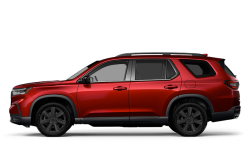To Lease or Buy Your Vehicle?
September 16 2019, Lallier Ste-Foy

To lease or buy? That’s the million-dollar question everyone faces when it’s time to purchase a new vehicle. But how do you go about answering this question and making the right choice?
Before choosing to finance or lease your new vehicle, it’s important to learn more about the differences between these two options. Keep reading for more information that we hope will be of use to you.
Learn more about renting
What is leasing?
Leasing a new vehicle essentially means:
- Getting a new vehicle without having to pay it in full
- Making monthly payments to pay for the use of the vehicle over a specified period of time
What does paying for “the use of the vehicle” mean?
This means that you pay for the depreciation of the vehicle over the term of the lease.
Thus, at the end of the lease, the vehicle has a depreciated value or a “residual value.”
To help you better understand, here’s an example:
If you lease your vehicle for a period of 48 months, your monthly payments will be lower than if you had bought your vehicle with financing.
These monthly payments are equivalent to those you would have if you had financed the vehicle for a period ranging between 65 to 75 months.
As the amortization period is longer than the lease term, you’ll benefit from lower monthly payments. However, after 48 months, you’ll have a debt that can be repaid in two ways. You can either buy the car at its residual value or return it to the dealership.
The residual value is decided in advance (i.e. when you sign the lease).
What happens at the end of the lease?
There are two options available to you at the end of the lease:
Return the vehicle to the dealership
Purchase the vehicle at its predetermined residual value
Who is leasing for?
Leasing is a great choice for you if:
- Your budget is limited
- You want lower monthly payments
- You don’t want a pre-owned vehicle
- You enjoy changing your vehicle every two or three years
- You travel a consistent number of kilometres every year
- You want a new premium vehicle for the cost of an entry-level model
In addition, if driving a new vehicle is more important to you than owning a vehicle, then leasing is definitely for you!
What are the advantages of leasing?
As we’ve previously mentioned, your monthly payments will be lower compared to when you finance your vehicle.
Leasing also has the following advantages:
- Your vehicle is always new
- Your vehicle costs less in maintenance because it’s new
- Your vehicle is covered under warranty for the duration of your lease
- Your commitment is relatively short, which reduces risk in the event that your financial situation changes
- You’ll enjoy owning the latest technology
Also, you won’t have to cover the cost of any additional depreciation of the vehicle if it’s been in an accident because the residual value has already been determined in advance.
You choose to lease: What should you look out for?
If you decide to lease, don’t forget to check the following:
- The number of kilometres that your lease allows you to travel every year
- The fees you’ll be charged for every additional kilometre travelled
- The number of extra kilometres you can buy at a lower price at the signing of the lease
- The definition of “normal wear and tear” of the vehicle (ask your representative to explain what it entails)
- The residual value: is it guaranteed? At Honda, it is. Ask your representative if you choose a different manufacturer.
Learn more about buying
Financing: Who is it for?
Financing is a great choice for you if:
- You cover a lot of kilometres in a year
- You want to keep your vehicle for a long time
- You like to negotiate the resale value of your vehicle
What are the advantages of financing?
Financing your vehicle has the following advantages:
- You become the owner of the vehicle after paying off your loan
- Once the loan is repaid, you can keep the vehicle for as long as you want
- You can make any changes you want to the vehicle, there are no restrictions because it belongs to you
- You are free to maintain or not maintain your vehicle. Be careful: a car whose mechanics and bodywork have been well-maintained will last longer and have a better resale value.
You choose to finance: What should you look out for?
If you decide to finance your vehicle, don’t forget to check the following so you don’t regret your purchase:
- Your budget: The monthly payment will be higher when financing compared to leasing.
- The long-term cost of maintenance: The older the vehicle, the higher the maintenance costs.
- Your needs: Such as the number of seats, cargo space, fuel consumption, etc.
- The behaviour of the vehicle: Take the vehicle for a proper test drive. You’ll have a better idea regarding its blind spots, handling, comfort, etc.
To conclude…
The monthly payments for leasing are lower than financing. At the end of the lease, you can return the keys to the dealership or become the owner of the vehicle by paying off the residual value.
Leasing is the ideal choice if you want a new vehicle but have a limited budget.
If your budget allows for the purchase of a vehicle but you’re not looking to own a vehicle, leasing can help you save. How? By paying the difference between the payment of the financing and the lease in an RRSP or TFSA.
No matter what mode of financing you choose, the dealership is only an intermediary between you and the credit company. The majority of manufacturers have their own credit company, as is the case with Honda and Honda Canada Finance. If you lease your vehicle, check to see if the credit company is that of the manufacturer’s. If it’s not, check to see if the residual value is guaranteed. What does “normal wear and tear” entail? What happens at the end of the lease? Who inspects the vehicle at the end of the lease? And more…
In short, whether you’re financing or leasing, the most important thing is that the vehicle meets your needs and the monthly payments suit your budget.


